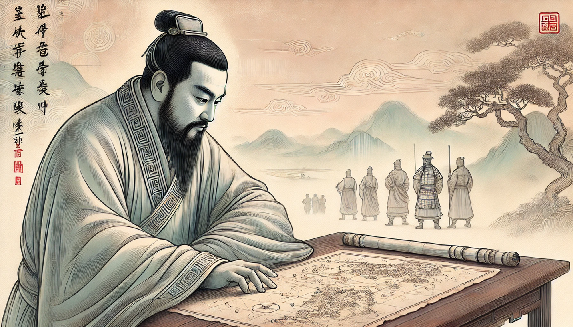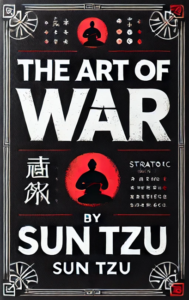SUMMARY
- Emphasises the importance of strategic planning and understanding both moral and practical aspects of warfare.
- Highlights the necessity of knowing oneself and the enemy, focusing on strengths and weaknesses.
- Advocates for adaptability in strategies to respond to changing circumstances and unforeseen challenges.
- Explores psychological aspects of conflict, including the maintenance of morale and the strategic use of information.
- Offers timeless insights applicable beyond military contexts, making it relevant for business and leadership strategies.
REVIEW
The Art of War by Sunzi is a timeless classic that has transcended its origins as a military treatise to become a guiding text in various fields, including business and leadership. Written in the late 6th century B.C., it offers strategic insights that remain relevant today, emphasising the importance of planning, adaptability, and understanding conflict dynamics. Sunzi’s work is not just about warfare; it is about the art of strategy itself, applicable to any competitive situation.
The book is structured around key principles that govern successful military operations. Sunzi begins by highlighting the importance of strategic planning and the need to understand both the moral and practical aspects of warfare. He emphasises the significance of knowing oneself and the enemy, advocating for a deep analysis of strengths and weaknesses. This foundational approach sets the stage for a detailed exploration of tactics and the need to adapt strategies to changing circumstances. The impact of the Art of War lies in its universal applicability; its principles can be applied beyond the battlefield to any competitive environment, making it a valuable resource for leaders and strategists across various domains.
Sunzi delves into concepts such as the importance of discipline, the role of deception, and the value of flexibility. He argues that victory is achieved not through brute force but through careful planning and the ability to adapt to unforeseen challenges. The text also explores the psychological aspects of warfare, emphasising the need to maintain morale and the strategic use of information. Sunzi provides a comprehensive guide to achieving success through strategic thinking and cunning, focusing on these key elements.
The Art of War is special because it distils complex strategic concepts into concise, actionable insights. Its enduring relevance is a testament to Sunzi’s profound understanding of human nature and conflict. The book’s ability to transcend its original context and offer guidance in diverse fields makes it a timeless masterpiece.

CHARACTERS
Sunzi: A legendary military strategist and the author of “The Art of War,” known for his insights on strategy and warfare.
The King of Wu: The ruler who initially sought Sunzi’s expertise to train his army, demonstrating the importance of strong leadership.
The Women Soldiers: The army trained by Sunzi, showcasing the principles of discipline and communication in military operations.
The Generals: Various unnamed military leaders who represent the challenges and decisions faced in warfare, often influenced by Sunzi’s teachings.
The Advisors: Counsellors to the King of Wu who provide strategic insights and support Sunzi’s military strategies.
IMPROVES
- Creativity and Imagination: Reading Sunzi can inspire innovative thinking and new ideas.
- Analytical Thinking: The strategic concepts in the book enhance critical analysis and problem-solving skills.
- Leadership: The principles of strategy and tactics can improve leadership abilities and decision-making.
- Emotional Intelligence: Understanding the nuances of conflict and resolution fosters better emotional awareness.
- Professional Development: The insights gained can be applied to advance one’s career and business acumen.
REFERENCES
- Review: Sun-tzu: Art of War by Ralph D. Sawyer – The Objective Standard
- Analysis of Sun Tzu’s Art of War – Liberty University
- Deciphering Sun Tzu: How to Read The Art of War by Derek M Yuen – LSE Review of Books
- Reconsidering Sun Tzu – USAWC Press
- Sun Tzu’s Art of War and the First Principles of International Humanitarian Law – Cambridge International Law Journal

